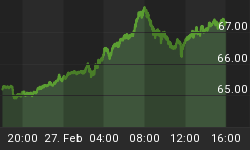The latest selloff in oil prices have left speculators in a predicament: The fundamentals continue to look poor with unimpressive drawdowns in crude oil stocks, but there is a general consensus that the extension of the OPEC deal should push the market towards a rebalancing over the next few quarters.
What that means for short-term movements in prices is unclear. The unpredictability of today's oil market is leaving some investors burned by unexpected price gyrations. For example, just ahead of the recent selloff in prices last week, oil traders bought up bets on rising prices. Hedge funds and other money managers increased their bullish bets by 7.3 percent for the week ending on June 6, but prices plunged by 5 percent a day later.
Traders looking for some direction might want to consider the futures market, where a contango structure has reemerged. A contango, in which near-term oil futures trade at a discount to futures dated further out, is a symptom of oversupply. For example, two weeks ago, futures for December 2017 traded at a $1 per barrel discount compared to contracts for delivery in December 2018. That discount ballooned to $1.49 per barrel last week, according to Bloomberg, a sign that investors are growing more pessimistic about oversupply conditions this year. "Brent spreads are getting clobbered," Amrita Sen, chief oil market analyst at consultants Energy Aspects Ltd., told Bloomberg. "The Atlantic Basin is awash in light crudes from Nigeria and Libya."
The December 2017-December 2018 spread is now deeper into contango territory than at any point since the original OPEC deal back in late 2016. In recent months the spread was positive - that is, the December 2017 contract traded at a premium compared to contracts a year later, a situation known as backwardation.
Several investment banks have insisted that OPEC's best hope at draining inventories was to do just that: Induce a state of backwardation into the market. By driving up near-term prices while pushing down the back end of the futures curve, the argument goes, OPEC could scare off shale drilling. Producers would be deprived of finance by skittish lenders, and they would be reluctant to drill if they expected prices to be lower in the future. OPEC could achieve this state of backwardation by maintaining cuts this year while also signaling production growth in the future.
If that is the strategy, so far it has not succeeded. The reemergence of the contango reflects concerns about the glut persisting through this year.
Meanwhile, investors are growing wary of an energy market that continues to spurn them. Energy companies have been among the worst performing stocks in 2017. The poor results are leading to an exodus of capital from energy-linked exchange-traded funds (ETFs). Over the past three months, more than $300 million have been pulled out of energy ETFs, according to Bloomberg, which will likely result in the first quarterly outflow of capital from energy ETFs in more than two years. "People are re-allocating money to sectors that are performing better, technology or health-care, versus sitting on a sector like energy that's down 10 plus percent," Jeff Carbone, managing partner of Cornerstone Financial Partners, told Bloomberg. "We're bottoming, but what pushes it higher? That's the hard part."
The flip side is that some think that the selloff in energy is overdone. That is exactly why hedge funds and other money managers bought up a greater net-long position in early June, even though some might feel they got in at the wrong time. Nevertheless, the cratering of oil prices last week has opened up a buying opportunity. "When you start to approach $45 a barrel in WTI, you're in an area where you do find some price support and I think there has been some evidence last week of investment flows coming back into crude oil," Petromatrix strategist Olivier Jakob said in a Reuters interview. Jakob cautioned that the room on the upside could still be limited. "You have to be careful not to be too optimistic for now," he said. "Physical differentials are still under pressure and the time structure is still under pressure in Brent. It's a bit premature to call for much higher oil prices."
So what happens next depends on who you ask. Market fundamentals look weak but some traders see attractive entry points.
Link to original article: http://oilprice.com/Energy/Crude-Oil/Has-Permian-Productivity-Peaked.html
By Nick Cunningham of Oilprice.com















